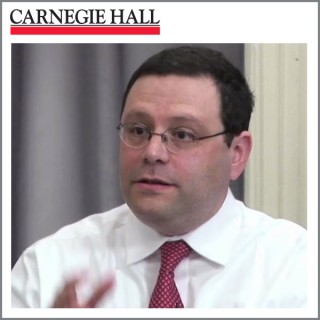
From the Carnegie Hall Archives
Follow From the Carnegie Hall ArchivesLearn more about the amazing people and memorable events that have enlivened Carnegie Hall since its opening in 1891.
- Jan 8, 2013 LATEST EPISODE
- infrequent NEW EPISODES
- 3m AVG DURATION
- 11 EPISODES
More podcasts from Carnegie Hall
Latest episodes from From the Carnegie Hall Archives

Gino Francesconi, director of Carnegie Hall's archives and Rose Museum,discusses Tchaikovsky's diligence in signing autographs during his visit to America to open Carnegie Hall in 1891.

Gino Francesconi, director of Carnegie Hall's archives and Rose Museum, recounts how Tchaikovsky was gratified that the US audiences were at least as knowledgeable about his music as the Russians.

Gino Francesconi, director of Carnegie Hall's archives and Rose Museum, reveals what it was like during the Golden Age of Music at Carnegie Hall.

Museum Director and Archivist Gino Francesconi explores the connections between Carnegie Hall, New York, and Tchaikovsky. Gino reveals how, amidst the turmoil of the decline of the Soviet Union in the late 1980s, Carnegie Hall was earmarked to become the guardian of many irreplaceable Tchaikovsky artifacts, including the Bible in which the great composer hid some flowers at Niagara Falls.

Gino Francesconi, director of Carnegie Hall's archives and Rose Museum, reveals some of the ways in which the holidays have been celebrated at the Hall over the decades, including Handel's "Messiah," stellar jazz line-ups, string orchestras—even a baby elephant.

Archives and Rose Museum Director Gino Francesconi reveals some of the key events from Carnegie Hall's history which featured Latin American artists and music. Included are the iconic 1947 concert when Cuban percussionist Chano Pozo joined Dizzy Gillespie for "Cubano Be, Cubano Bop" and the birth of Afro-Cuban jazz, 1962's historic concert that introduced bossa nova to American audiences, and the surprise appearance of Chucho Valdés and Irakere during the 1978 Newport Jazz Festival at the Hall.

Rose Museum and Archives Director Gino Francesconi explains how Andrew Carnegie was set apart from his Gilded Age contemporaries by his different approach to wealth.

As the Yannick Nézet-Séguin era begins at The Philadelphia Orchestra, Carnegie Hall's Archives and Rose Museum Director Gino Francesconi reveals the long history and close association the orchestra has with Carnegie Hall. Since its debut here in 1902, The Philadelphia Orchestra has performed more than 800 times under the baton of such conducting giants as Stokowski, Ormandy, and Muti.

On May 5, 1891, Carnegie Hall opened its doors for the first time, Tchaikovsky ushering in a new standard for the presentation of live music and public events in New York City.

Gino Francesconi, director of Carnegie Hall's archives and Rose Museum, reveals how this Tchaikovsky favorite was very much on the composer's mind during his North American trip.

It was a pivotal moment in history. Industrialization had taken hold of the United States. New York City was emerging as an international capitol. And in 1891, Carnegie Hall, its cultural gem, opened its doors with Pyotr Ilyich Tchaikovsky on its stage.

















